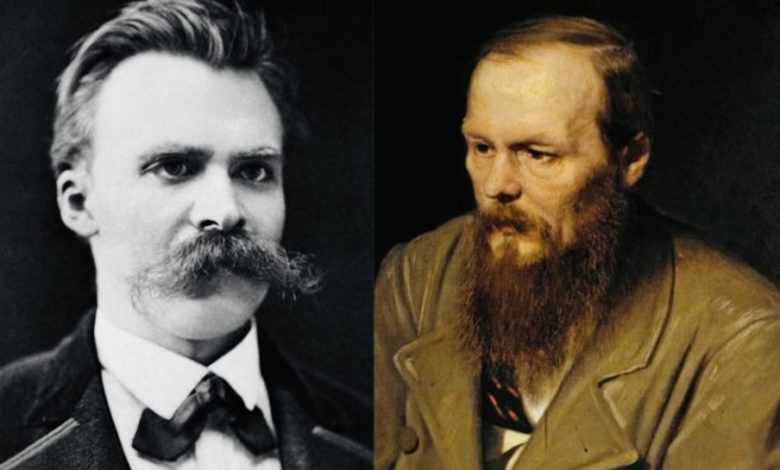The Negative Impact of Nihilism on Society part II

By Khaza Mokhammed Ph.D. Philology
Adele Cain M.A.
Nietzsche as a perfect example of nihilism.
Nietzsche, the German philosopher, essayist, and critic, wrote about truth, morality, language, aesthetics, cultural theory, history, nihilism, power, consciousness and the meaning of existence. His work had a huge impact on Western philosophy and history. Nietzsche spoke of the “death of God”, and foresaw the collapse of traditional religion and metaphysics. Some interpreters of Nietzsche believe that he founded nihilism, rejected philosophical reasoning, and also contributed to the literary study of the human condition, which is not about the acquisition of truth and knowledge in the traditional sense of these terms. However, other interpreters of Nietzsche have said he called for a radical, naturalistic rethinking of the nature of human existence, knowledge, and morality. Nietzsche argued that an exemplary person should develop his own identity through self-realisation and do this without relying on concepts such as God or soul. According to some scholars, Nietzsche put forward a cosmological theory of “will to power”, a world on the path of tension to human catastrophe. Considering himself Europe’s foremost nihilist, Nietzsche urges people to understand nihilism, as he considers its spread inevitable. After all, it is this trend that will act as a solution to the problems that have matured in society, which will be impossible to solve in any other way. Questions concerning the coherence of Nietzsche’s views – questions such as whether his views could be taken together without contradiction, whether readers should discredit any particular one if shown to be incoherent or incompatible with each other, and the like – continue to attract the attention of modern historians and philosophers. Nietzsche admitted that he could be a teacher of other people, because he knows about the contradictions of life, he considers himself such a contradiction. Soviet researchers adhered to the first opinion, considering Nietzsche “an immoral singer of violence and cruelty”, a preacher of war, praising “social inequality and slavery as the engines of culture.” These postulates of his theory, they argue, led to the birth of the most destructive such phenomenon in all history: Nazism.
Russian nihilism in the 19th century
Nihilism is the destroyer of interpersonal relationships. A person drops out of social networks because they are based on mutual duties and rights.
The dying Yevgeny Bazarov also said an expressive phrase: “I wanted to deny death, but it denies me.” He dies from infection, but with his thirst for self-affirmation and the desire to enter into conflicts with people around him (he shot himself in a duel with Pavel Petrovich), his life would have been interrupted early in any case.
Dostoevsky and nihilism is a topic so multifaceted and mysterious that it is difficult to approach it from any direction; the concept of “nihilism” was for Dostoevsky extremely broad. In Demons, during a fire, the demented governor von Lembke cries out in despair: “Everything is on fire! This is nihilism! If anything is on fire, it is nihilism!” This remark, which at first glance seems like a curiosity and a product of a sick mind, contains a deep meaning. Is it possible, it would seem, a direct connection between the phenomenon that Turgenev first described in Fathers and Sons, and the popular unrest that resulted in the burning of part of the city? Meanwhile, this connection exists; and for Dostoevsky in the concept “nihilism” was associated with the most diverse trends of contemporary Russian life, the most diverse moods that permeated it.
Dobrolyubov
The last two quotations are from the first half of the 1860s; at this time, according to the researcher, “Dostoevsky’s attitude towards nihilism and nihilists … were not irreconcilably negative”. However, in spite of the blinded fury with which Dostoevsky began in 1870 The Demons, a novel about Nechaev and the Nechaevites, his attitude toward nihilism did not become irreconcilably negative either then or later. On this occasion, it is appropriate to quote N.A. Dobrolyubov: “In the works of Mr.Dostoevsky, we find one common feature, more or less noticeable in everything that he wrote: this is the pain of a person who recognizes himself as unable or, finally, not even entitled to be a real person, complete … on his own.”
The concept of nihilism matured in Dostoevsky over a long period and not in a straightforward way. We find its first sprouts already in the “Series of Articles on Russian Literature” – the cycle was created in 1861, even before Turgenev’s discovery of nihilism. In Winter Notes on Summer Impressions (1863), Dostoevsky welcomed the emergence of a new type in Russian literature; at the same time, Dostoevsky’s like-minded critic N. N. Strakhov foreshadowed a great literary future for the “new man” type. For the formation of the concept of nihilism in the writer, the story “Notes from the Underground” (1864) became an important moment. The hero of the story was the unnamed narrator; however, he already somewhat resembled Bazarov (Yevgeny Bazarov, the fictional character in the Turgenev novel Fathers and Sons) with his firm determination to “only swear”.
Dostoevsky’s next major work, Crime and Punishment, was one of the main links in the embodiment of Dostoevsky’s vision of nihilism. The protagonist of the novel, Raskolnikov, is undoubtedly close in spirit to the main nihilist of Russian literature; unlike Bazarov, however, he did not “just swear” and was a practitioner. Testing his theory in action led Raskolnikov to realise the failure of his own “nihilism”; the author gave the hero the opportunity to repent only after he suffered a complete moral collapse. At this stage, therefore, Dostoevsky’s concept of nihilism was not yet fully developed: the nihilists he portrayed later were much more convinced, and it was almost impossible to make them doubt their beloved ideas.





